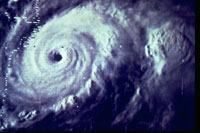Hurricanes Happen More Frequent than in 1000 Years
According to a study published in the journal Nature, hurricanes in the Atlantic are more frequent than at any time in the last 1,000 years and could get worse due to global warming.

Scientists made their calculation by examining sediments left by hurricanes that crossed the coast in North America and the Caribbean, the journal says, The USA Today reports.
The study's lead author, climate scientist Michael Mann of Pennsylvania State University, said finding a reliable way to reconstruct centuries of past hurricane activity could help scientists tease out whether future climate change will alter storm patterns.
"One of the driving motivations for this research is to place in a longer-term context ... Atlantic tropical cyclone behavior, and the extent to which it may be anomalous," he said.
That meant trying to divine information about the past beyond historical records collected by ships and observers on shore, and later by storm-tracking aircraft and satellite, The New York Times reports.
An average of 17 hurricans and tropical storms hit the Atlantic in the last decade, which is more than twice the number recorded earlier in the century.
However, there may have been more storms 1,000 years ago than in modern times. Current levels were matched, and may have been exceeded, during the Medieval Climate Anomaly about 1,000 years ago.
Dr. Mann says the circumstances forming the high hurricane activity now are different than 1,000 years ago.
“Even though the levels of activity are similar [between 1,000 years ago and now], the factors behind that are different,” Dr Mann told BBC News.
“The implication is that if everything else is equal — and we don’t know that about El Nino — then warming of the tropical Atlantic should lead to
increasing levels of Atlantic tropical cyclone activity.”
The high number now is spurred by warming waters in the Atlantic Ocean, expected to increase even further in coming years, The National Post reports.
Subscribe to Pravda.Ru Telegram channel, Facebook, RSS!


